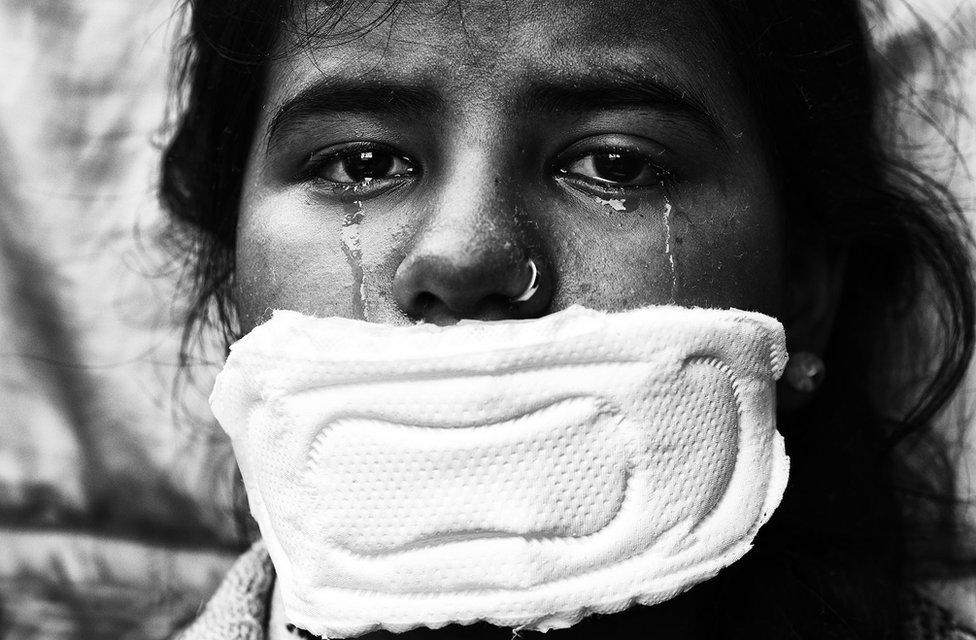Why India must battle the shame of period stain
- Published

Discrimination against menstruating women is widespread in India, where periods have long been a taboo and considered impure.
They are often excluded from social and religious events, denied entry into temples and shrines and even kept out of kitchens.
On the occasion of World Menstrual Hygiene Day, award winning photographer Niraj Gera attempts to de-stigmatise periods in this hard-hitting series called Sacred Stains.
Given the lack of conversation about periods, according to one study, 71% of adolescent girls in India are unaware of menstruation until they get it themselves.
Campaigners say it shows that parents rarely prepare their daughters for something they know is bound to happen. And this unpreparedness leads to so much avoidable fear and anxiety.
The difficulty of accessing sanitary pads is another major issue.
India scrapped a 12% tax on sanitary products in 2018 after months of campaigning by activists.
Campaigners had argued that menstrual hygiene products were not a luxury and periods were not a choice that a woman could simply opt out of.
However, tax exemption is only a small step towards a much longer journey of making menstrual health and hygiene an accessible reality for every woman in the country.
According to one study, , while the rest use old rags, husk, ash, leaves, mud and soil and such other life-threatening materials to manage their flow.
And menstrual health experts say the current coronavirus crisis has worsened matters further in India. The country is under a strict lockdown which has severely impacted production and supplies of menstrual hygiene products.
Of course, period poverty does not only affect women in India.
According to Plan International UK, an international development charity, one in 10 disadvantaged girls below the age of 21 cannot afford sanitary products and uses unhygienic substitutes such as newspaper, toilet paper and socks.
From an early age, girls learn to live with the pain and fear and seldom do we see a girl seek help when in physical or mental discomfort due to periods.
But with a surge in the use of social media in recent years, women have begun sharing their stories about menstruation too.
Yet this freedom is often questioned and those sharing their stories are threatened with bans, while trolls who indulge in moral policing and shaming women go scot-free.
"It's time to not silence them with shame, but give them the freedom and knowledge to deal with the pain. Social media is a powerful tool and it should be used to spread positivity and awareness among the people," says Mr Gera.
Millions of families across India cannot afford to buy menstrual hygiene products.
In the photo above, a daily-wage labourer's daughter wants a pad, Mr Gera says, but feels guilty to even ask her family for the money to buy it.
For them, it's a toss-up between spending on food for the family or purchasing sanitary napkins.
The photographer has launched a petition through his charity - - demanding free distribution of pads to all women and girls living below the poverty line in India.
after they start their periods, according to a 2014 study by Dasra, a charity that works on issues of adolescent health.
Campaigners say the main reasons are a lack of clean toilets in schools and poor access to sanitary products.
There's also fear of staining and girls worry about being mocked by their classmates.
The study also found that a large number of women considered periods as dirty, explaining why menstruating women are often ostracised from social and cultural activities and are forced to put up with all sorts of restrictions.
"It is time we realise that menstruation is just a biological process and the secrecy surrounding it must go. It is important to normalise menstruation and destroy taboos around this natural process," he says.
"Talking is all it takes to begin a transformation and it's time we did it."
All photographs are copyright: Niraj Gera
- Published22 May 2020
- Published16 February 2020
- Published5 July 2019
- Published25 February 2019